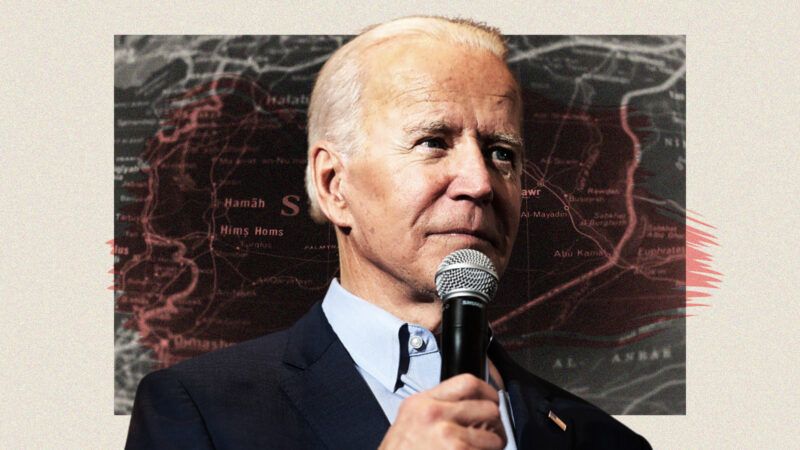Sanctions on Syria Aren't Punishing Assad. They're Hurting Syrians.
Piling on sanctions and blocking other countries' reconstruction efforts will only punish the Syrian people.

While rising oil prices have blunted U.S. sanctions targeting Russia, which saw its oil revenue generate 93 billion euros, no lifeline has spared Syria—specifically the Syrian people—from the Caesar Syria Civilian Protection Act.
Today marks two years since the Caesar Act came into effect. The act expanded upon past U.S. sanctions, targeting "anyone providing support to the Syrian government and senior political figures, supporting the Syrian oil and gas industry, providing military aircraft or parts, and providing construction or engineering services directly or indirectly to the Syrian government"—opening the door for the U.S. to sanction not only Syrian President Bashar al-Assad's allies within the country's borders but also any foreign entities willing to help him.
This strategy of maximum pressure sanctions has not worked. So far, it has garnered few concessions and extracted no meaningful change. Though it is successfully delivering punitive justice, the U.S. sanctions strategy in Syria does not punish Assad—it punishes Syrians, whether they support the regime or not. Currently, nine in 10 Syrians live in poverty, and more than six in 10 face the risk of going hungry. U.S. sanctions exacerbate Syria's immiserated economic condition by blocking prospective economic cooperation from willing regional or international partners.
The U.S. sanctions campaign in Syria intended to cause enough economic harm to pressure the government to such a point that it would "crack," making it impossible for Assad to remain in power or forcing concessions regarding human rights and availability of aid. Despite Washington's best efforts over the last decade, the pain the U.S. has inflicted upon Syria and its people has not translated into a change in regime or behavior, branding the current sanctions and any future sanctions the United States may levy as impotent and futile.
These sanctions have failed for two reasons: the U.S. is asking for unattainable ends that Assad views as detrimental to his security and power, and Assad is able to weather the sanctions with Russian and Iranian support. There is no strategic or moral case for sanctions if, while noble in theory, they prove to be a devastating means with no achievable or productive end.
Syria's neighbors have started to recognize the reality Washington refuses to admit—Assad is not going anywhere and neither is Syria's Russian and Iranian backing. Beginning in December 2018, Arab countries began to reopen their embassies in Damascus—the United Arab Emirates (UAE) being the first to do so. Today, 13 Arab League countries have reengaged with Assad, and all but two countries – Kuwait and Qatar – appear supportive of reengagement with Syria.
Emirati Foreign Minister Sheikh Abdullah bin Zayed even criticized the Caesar Act; the UAE is willing to help Syria, but the cost of prospective sanctions "makes this path very difficult, not only for us as a nation, but also for the private sector." Still, the U.S. refuses to deviate from its policy of regime isolation. The U.S. should encourage potential support from regional partners—those with a greater stake in Syria's future stability than the United States. It is in our interest to shift the cost of reconstruction onto regional partners, such as the UAE, which has the means, willingness, and compelling interest to bear this burden instead of repelling potential foreign investment. The last thing the U.S. should want is to shoulder the estimated $250 billion to $400 billion reconstruction bill for Syria's reconstruction alone.
It is prudent to disperse the cost of Syria's recovery to others who are willing and able. If not, it will only be more likely that the U.S. will foot the bill once it grows weary of its own obstinacy. By continuing this pattern, the Syrian people will be forced to pay the price in the meantime.
Piling on sanctions and blocking other countries' reconstruction efforts will punish the Syrian people, but it will not change Assad's position, liberalize his regime, or promote greater regional stability. The strategic and moral imperative is for the Biden administration to abandon a harsh, failed, sanctions-based policy for one based on diplomacy and buck-passing. Such a policy would benefit the United States and spare the Syrian people needless hardship after 11 years of civil war.
